Wider Professional Practice in Education and Training - LSC&IT
VerifiedAdded on 2023/01/03
|15
|5647
|10
Report
AI Summary
This report delves into the intricacies of wider professional practice in education and training, with a specific focus on the London School of Commerce and IT (LSC&IT). It begins by defining professionalism and dual professionalism within the educational context, exploring how personal values influence practice in specialized areas. The report then examines the impact of social, political, and economic factors on education policy, analyzing the effects of current policies on curriculum and practice at LSC&IT. Furthermore, it investigates the roles of stakeholders and external bodies in education and training, assessing their impact on organizational accountability, curriculum design, delivery, and assessment. The report also highlights the importance of partnerships with employers and other stakeholders. The report underscores the importance of quality assurance and the quality cycle in maintaining high educational standards.
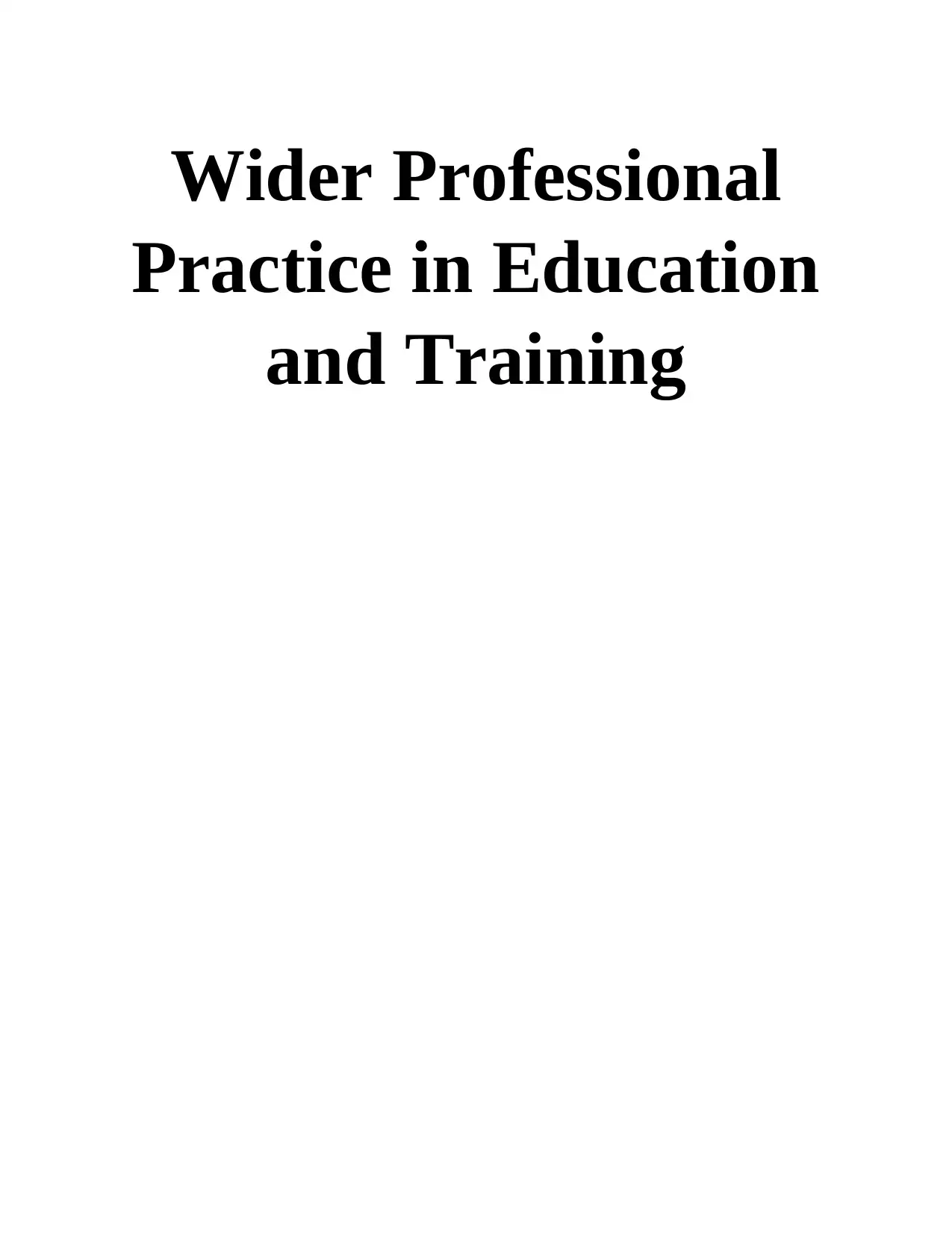
Wider Professional
Practice in Education
and Training
Practice in Education
and Training
Paraphrase This Document
Need a fresh take? Get an instant paraphrase of this document with our AI Paraphraser
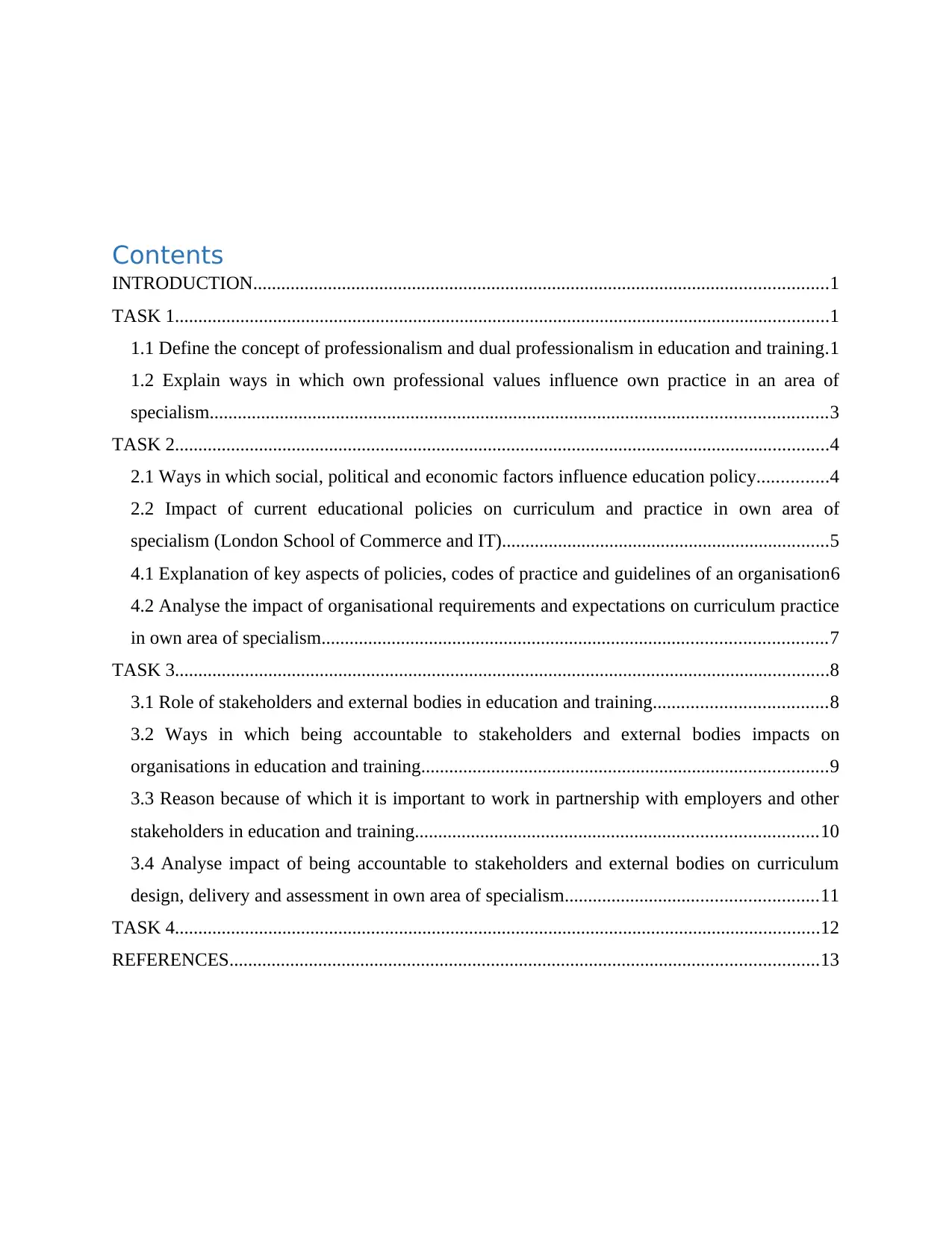
Contents
INTRODUCTION...........................................................................................................................1
TASK 1............................................................................................................................................1
1.1 Define the concept of professionalism and dual professionalism in education and training.1
1.2 Explain ways in which own professional values influence own practice in an area of
specialism....................................................................................................................................3
TASK 2............................................................................................................................................4
2.1 Ways in which social, political and economic factors influence education policy...............4
2.2 Impact of current educational policies on curriculum and practice in own area of
specialism (London School of Commerce and IT)......................................................................5
4.1 Explanation of key aspects of policies, codes of practice and guidelines of an organisation6
4.2 Analyse the impact of organisational requirements and expectations on curriculum practice
in own area of specialism............................................................................................................7
TASK 3............................................................................................................................................8
3.1 Role of stakeholders and external bodies in education and training.....................................8
3.2 Ways in which being accountable to stakeholders and external bodies impacts on
organisations in education and training.......................................................................................9
3.3 Reason because of which it is important to work in partnership with employers and other
stakeholders in education and training......................................................................................10
3.4 Analyse impact of being accountable to stakeholders and external bodies on curriculum
design, delivery and assessment in own area of specialism......................................................11
TASK 4..........................................................................................................................................12
REFERENCES..............................................................................................................................13
INTRODUCTION...........................................................................................................................1
TASK 1............................................................................................................................................1
1.1 Define the concept of professionalism and dual professionalism in education and training.1
1.2 Explain ways in which own professional values influence own practice in an area of
specialism....................................................................................................................................3
TASK 2............................................................................................................................................4
2.1 Ways in which social, political and economic factors influence education policy...............4
2.2 Impact of current educational policies on curriculum and practice in own area of
specialism (London School of Commerce and IT)......................................................................5
4.1 Explanation of key aspects of policies, codes of practice and guidelines of an organisation6
4.2 Analyse the impact of organisational requirements and expectations on curriculum practice
in own area of specialism............................................................................................................7
TASK 3............................................................................................................................................8
3.1 Role of stakeholders and external bodies in education and training.....................................8
3.2 Ways in which being accountable to stakeholders and external bodies impacts on
organisations in education and training.......................................................................................9
3.3 Reason because of which it is important to work in partnership with employers and other
stakeholders in education and training......................................................................................10
3.4 Analyse impact of being accountable to stakeholders and external bodies on curriculum
design, delivery and assessment in own area of specialism......................................................11
TASK 4..........................................................................................................................................12
REFERENCES..............................................................................................................................13
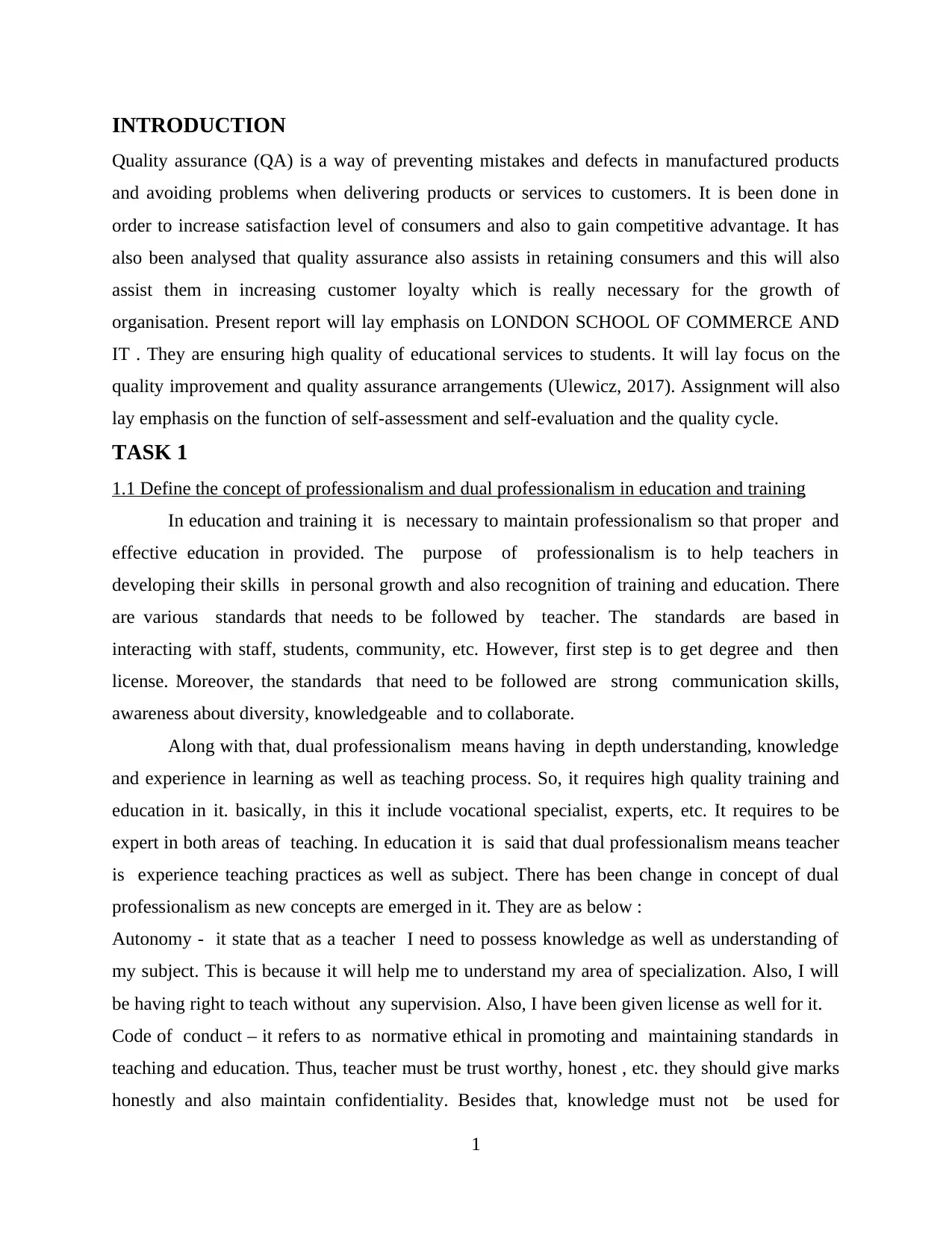
INTRODUCTION
Quality assurance (QA) is a way of preventing mistakes and defects in manufactured products
and avoiding problems when delivering products or services to customers. It is been done in
order to increase satisfaction level of consumers and also to gain competitive advantage. It has
also been analysed that quality assurance also assists in retaining consumers and this will also
assist them in increasing customer loyalty which is really necessary for the growth of
organisation. Present report will lay emphasis on LONDON SCHOOL OF COMMERCE AND
IT . They are ensuring high quality of educational services to students. It will lay focus on the
quality improvement and quality assurance arrangements (Ulewicz, 2017). Assignment will also
lay emphasis on the function of self-assessment and self-evaluation and the quality cycle.
TASK 1
1.1 Define the concept of professionalism and dual professionalism in education and training
In education and training it is necessary to maintain professionalism so that proper and
effective education in provided. The purpose of professionalism is to help teachers in
developing their skills in personal growth and also recognition of training and education. There
are various standards that needs to be followed by teacher. The standards are based in
interacting with staff, students, community, etc. However, first step is to get degree and then
license. Moreover, the standards that need to be followed are strong communication skills,
awareness about diversity, knowledgeable and to collaborate.
Along with that, dual professionalism means having in depth understanding, knowledge
and experience in learning as well as teaching process. So, it requires high quality training and
education in it. basically, in this it include vocational specialist, experts, etc. It requires to be
expert in both areas of teaching. In education it is said that dual professionalism means teacher
is experience teaching practices as well as subject. There has been change in concept of dual
professionalism as new concepts are emerged in it. They are as below :
Autonomy - it state that as a teacher I need to possess knowledge as well as understanding of
my subject. This is because it will help me to understand my area of specialization. Also, I will
be having right to teach without any supervision. Also, I have been given license as well for it.
Code of conduct – it refers to as normative ethical in promoting and maintaining standards in
teaching and education. Thus, teacher must be trust worthy, honest , etc. they should give marks
honestly and also maintain confidentiality. Besides that, knowledge must not be used for
1
Quality assurance (QA) is a way of preventing mistakes and defects in manufactured products
and avoiding problems when delivering products or services to customers. It is been done in
order to increase satisfaction level of consumers and also to gain competitive advantage. It has
also been analysed that quality assurance also assists in retaining consumers and this will also
assist them in increasing customer loyalty which is really necessary for the growth of
organisation. Present report will lay emphasis on LONDON SCHOOL OF COMMERCE AND
IT . They are ensuring high quality of educational services to students. It will lay focus on the
quality improvement and quality assurance arrangements (Ulewicz, 2017). Assignment will also
lay emphasis on the function of self-assessment and self-evaluation and the quality cycle.
TASK 1
1.1 Define the concept of professionalism and dual professionalism in education and training
In education and training it is necessary to maintain professionalism so that proper and
effective education in provided. The purpose of professionalism is to help teachers in
developing their skills in personal growth and also recognition of training and education. There
are various standards that needs to be followed by teacher. The standards are based in
interacting with staff, students, community, etc. However, first step is to get degree and then
license. Moreover, the standards that need to be followed are strong communication skills,
awareness about diversity, knowledgeable and to collaborate.
Along with that, dual professionalism means having in depth understanding, knowledge
and experience in learning as well as teaching process. So, it requires high quality training and
education in it. basically, in this it include vocational specialist, experts, etc. It requires to be
expert in both areas of teaching. In education it is said that dual professionalism means teacher
is experience teaching practices as well as subject. There has been change in concept of dual
professionalism as new concepts are emerged in it. They are as below :
Autonomy - it state that as a teacher I need to possess knowledge as well as understanding of
my subject. This is because it will help me to understand my area of specialization. Also, I will
be having right to teach without any supervision. Also, I have been given license as well for it.
Code of conduct – it refers to as normative ethical in promoting and maintaining standards in
teaching and education. Thus, teacher must be trust worthy, honest , etc. they should give marks
honestly and also maintain confidentiality. Besides that, knowledge must not be used for
1
⊘ This is a preview!⊘
Do you want full access?
Subscribe today to unlock all pages.

Trusted by 1+ million students worldwide
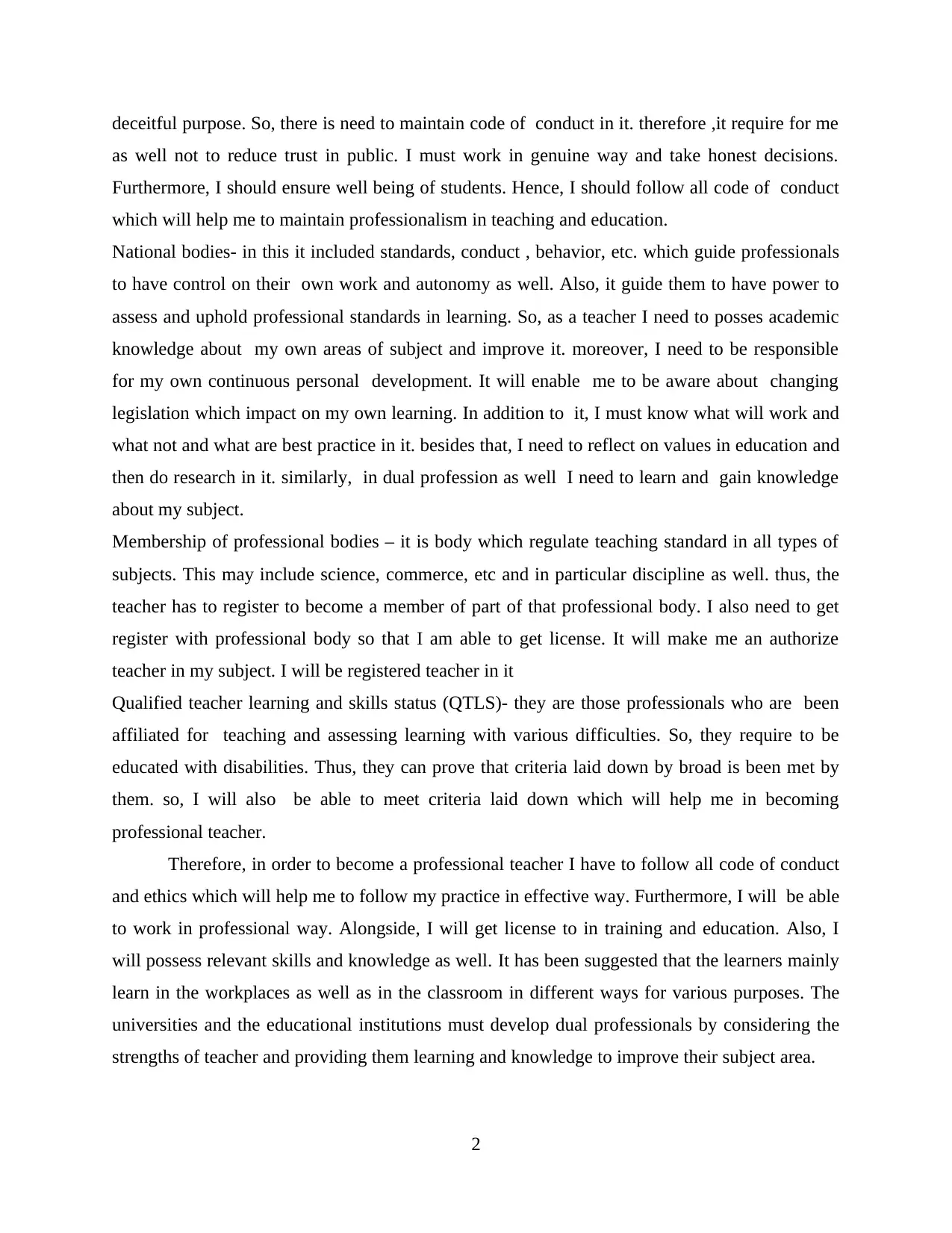
deceitful purpose. So, there is need to maintain code of conduct in it. therefore ,it require for me
as well not to reduce trust in public. I must work in genuine way and take honest decisions.
Furthermore, I should ensure well being of students. Hence, I should follow all code of conduct
which will help me to maintain professionalism in teaching and education.
National bodies- in this it included standards, conduct , behavior, etc. which guide professionals
to have control on their own work and autonomy as well. Also, it guide them to have power to
assess and uphold professional standards in learning. So, as a teacher I need to posses academic
knowledge about my own areas of subject and improve it. moreover, I need to be responsible
for my own continuous personal development. It will enable me to be aware about changing
legislation which impact on my own learning. In addition to it, I must know what will work and
what not and what are best practice in it. besides that, I need to reflect on values in education and
then do research in it. similarly, in dual profession as well I need to learn and gain knowledge
about my subject.
Membership of professional bodies – it is body which regulate teaching standard in all types of
subjects. This may include science, commerce, etc and in particular discipline as well. thus, the
teacher has to register to become a member of part of that professional body. I also need to get
register with professional body so that I am able to get license. It will make me an authorize
teacher in my subject. I will be registered teacher in it
Qualified teacher learning and skills status (QTLS)- they are those professionals who are been
affiliated for teaching and assessing learning with various difficulties. So, they require to be
educated with disabilities. Thus, they can prove that criteria laid down by broad is been met by
them. so, I will also be able to meet criteria laid down which will help me in becoming
professional teacher.
Therefore, in order to become a professional teacher I have to follow all code of conduct
and ethics which will help me to follow my practice in effective way. Furthermore, I will be able
to work in professional way. Alongside, I will get license to in training and education. Also, I
will possess relevant skills and knowledge as well. It has been suggested that the learners mainly
learn in the workplaces as well as in the classroom in different ways for various purposes. The
universities and the educational institutions must develop dual professionals by considering the
strengths of teacher and providing them learning and knowledge to improve their subject area.
2
as well not to reduce trust in public. I must work in genuine way and take honest decisions.
Furthermore, I should ensure well being of students. Hence, I should follow all code of conduct
which will help me to maintain professionalism in teaching and education.
National bodies- in this it included standards, conduct , behavior, etc. which guide professionals
to have control on their own work and autonomy as well. Also, it guide them to have power to
assess and uphold professional standards in learning. So, as a teacher I need to posses academic
knowledge about my own areas of subject and improve it. moreover, I need to be responsible
for my own continuous personal development. It will enable me to be aware about changing
legislation which impact on my own learning. In addition to it, I must know what will work and
what not and what are best practice in it. besides that, I need to reflect on values in education and
then do research in it. similarly, in dual profession as well I need to learn and gain knowledge
about my subject.
Membership of professional bodies – it is body which regulate teaching standard in all types of
subjects. This may include science, commerce, etc and in particular discipline as well. thus, the
teacher has to register to become a member of part of that professional body. I also need to get
register with professional body so that I am able to get license. It will make me an authorize
teacher in my subject. I will be registered teacher in it
Qualified teacher learning and skills status (QTLS)- they are those professionals who are been
affiliated for teaching and assessing learning with various difficulties. So, they require to be
educated with disabilities. Thus, they can prove that criteria laid down by broad is been met by
them. so, I will also be able to meet criteria laid down which will help me in becoming
professional teacher.
Therefore, in order to become a professional teacher I have to follow all code of conduct
and ethics which will help me to follow my practice in effective way. Furthermore, I will be able
to work in professional way. Alongside, I will get license to in training and education. Also, I
will possess relevant skills and knowledge as well. It has been suggested that the learners mainly
learn in the workplaces as well as in the classroom in different ways for various purposes. The
universities and the educational institutions must develop dual professionals by considering the
strengths of teacher and providing them learning and knowledge to improve their subject area.
2
Paraphrase This Document
Need a fresh take? Get an instant paraphrase of this document with our AI Paraphraser
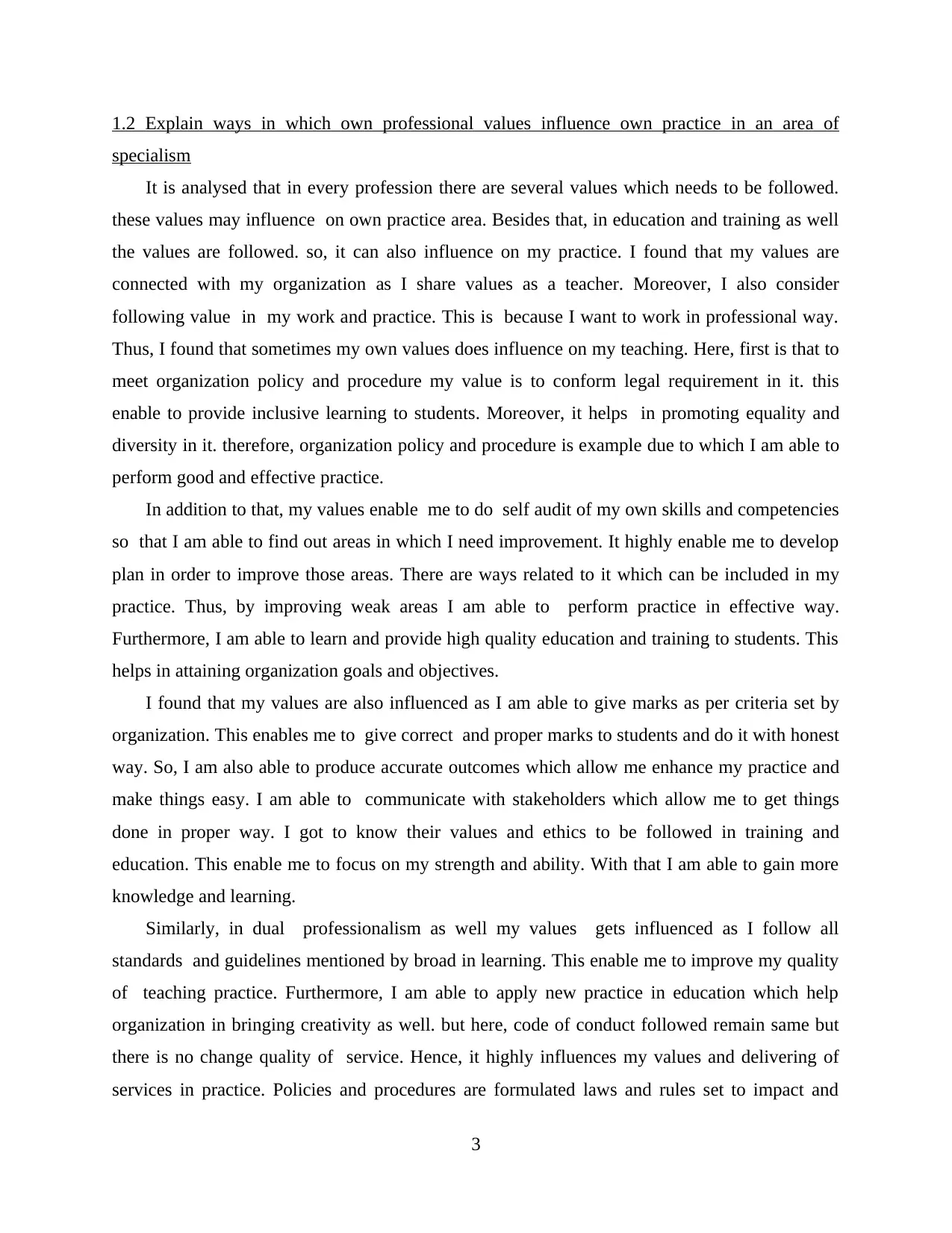
1.2 Explain ways in which own professional values influence own practice in an area of
specialism
It is analysed that in every profession there are several values which needs to be followed.
these values may influence on own practice area. Besides that, in education and training as well
the values are followed. so, it can also influence on my practice. I found that my values are
connected with my organization as I share values as a teacher. Moreover, I also consider
following value in my work and practice. This is because I want to work in professional way.
Thus, I found that sometimes my own values does influence on my teaching. Here, first is that to
meet organization policy and procedure my value is to conform legal requirement in it. this
enable to provide inclusive learning to students. Moreover, it helps in promoting equality and
diversity in it. therefore, organization policy and procedure is example due to which I am able to
perform good and effective practice.
In addition to that, my values enable me to do self audit of my own skills and competencies
so that I am able to find out areas in which I need improvement. It highly enable me to develop
plan in order to improve those areas. There are ways related to it which can be included in my
practice. Thus, by improving weak areas I am able to perform practice in effective way.
Furthermore, I am able to learn and provide high quality education and training to students. This
helps in attaining organization goals and objectives.
I found that my values are also influenced as I am able to give marks as per criteria set by
organization. This enables me to give correct and proper marks to students and do it with honest
way. So, I am also able to produce accurate outcomes which allow me enhance my practice and
make things easy. I am able to communicate with stakeholders which allow me to get things
done in proper way. I got to know their values and ethics to be followed in training and
education. This enable me to focus on my strength and ability. With that I am able to gain more
knowledge and learning.
Similarly, in dual professionalism as well my values gets influenced as I follow all
standards and guidelines mentioned by broad in learning. This enable me to improve my quality
of teaching practice. Furthermore, I am able to apply new practice in education which help
organization in bringing creativity as well. but here, code of conduct followed remain same but
there is no change quality of service. Hence, it highly influences my values and delivering of
services in practice. Policies and procedures are formulated laws and rules set to impact and
3
specialism
It is analysed that in every profession there are several values which needs to be followed.
these values may influence on own practice area. Besides that, in education and training as well
the values are followed. so, it can also influence on my practice. I found that my values are
connected with my organization as I share values as a teacher. Moreover, I also consider
following value in my work and practice. This is because I want to work in professional way.
Thus, I found that sometimes my own values does influence on my teaching. Here, first is that to
meet organization policy and procedure my value is to conform legal requirement in it. this
enable to provide inclusive learning to students. Moreover, it helps in promoting equality and
diversity in it. therefore, organization policy and procedure is example due to which I am able to
perform good and effective practice.
In addition to that, my values enable me to do self audit of my own skills and competencies
so that I am able to find out areas in which I need improvement. It highly enable me to develop
plan in order to improve those areas. There are ways related to it which can be included in my
practice. Thus, by improving weak areas I am able to perform practice in effective way.
Furthermore, I am able to learn and provide high quality education and training to students. This
helps in attaining organization goals and objectives.
I found that my values are also influenced as I am able to give marks as per criteria set by
organization. This enables me to give correct and proper marks to students and do it with honest
way. So, I am also able to produce accurate outcomes which allow me enhance my practice and
make things easy. I am able to communicate with stakeholders which allow me to get things
done in proper way. I got to know their values and ethics to be followed in training and
education. This enable me to focus on my strength and ability. With that I am able to gain more
knowledge and learning.
Similarly, in dual professionalism as well my values gets influenced as I follow all
standards and guidelines mentioned by broad in learning. This enable me to improve my quality
of teaching practice. Furthermore, I am able to apply new practice in education which help
organization in bringing creativity as well. but here, code of conduct followed remain same but
there is no change quality of service. Hence, it highly influences my values and delivering of
services in practice. Policies and procedures are formulated laws and rules set to impact and
3
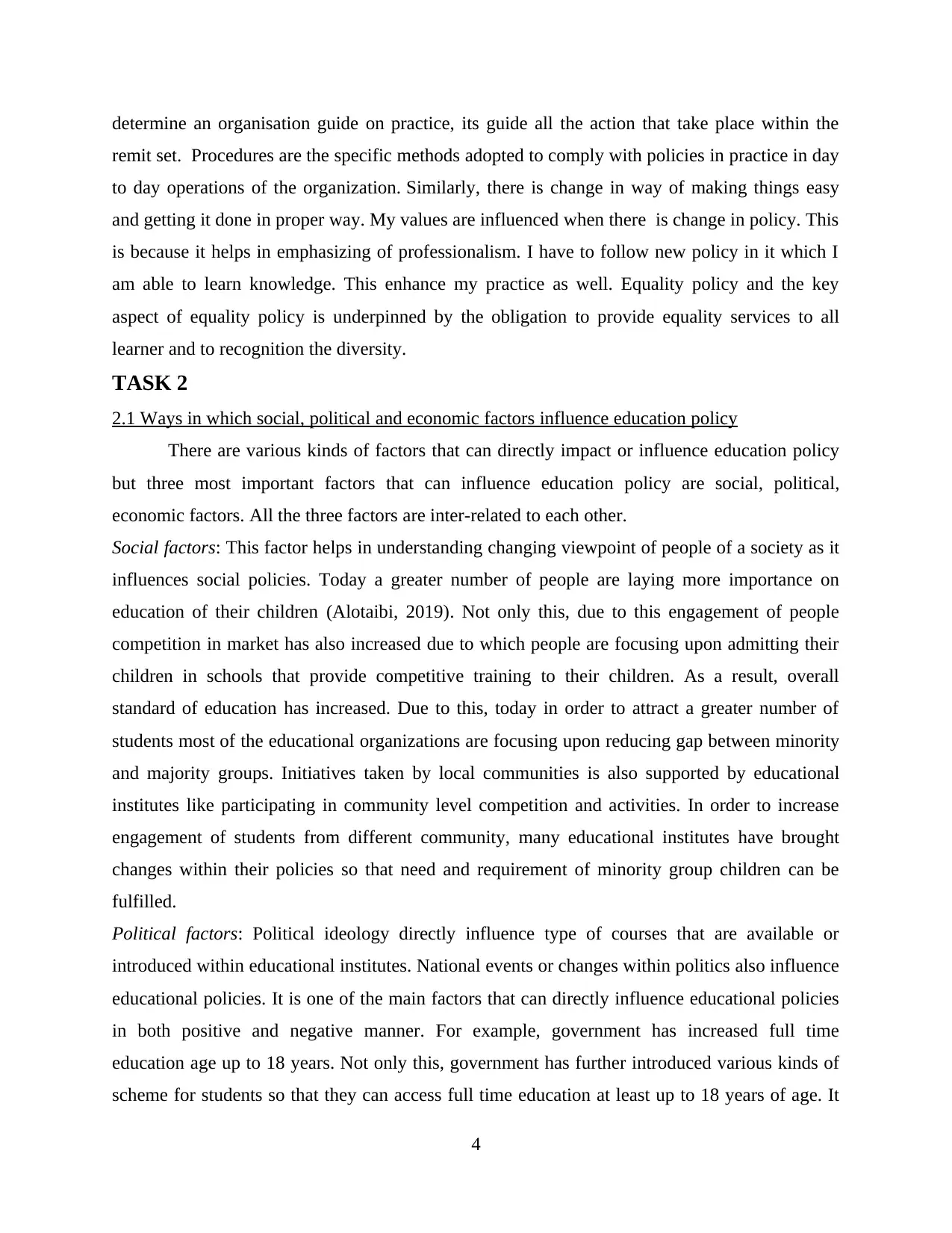
determine an organisation guide on practice, its guide all the action that take place within the
remit set. Procedures are the specific methods adopted to comply with policies in practice in day
to day operations of the organization. Similarly, there is change in way of making things easy
and getting it done in proper way. My values are influenced when there is change in policy. This
is because it helps in emphasizing of professionalism. I have to follow new policy in it which I
am able to learn knowledge. This enhance my practice as well. Equality policy and the key
aspect of equality policy is underpinned by the obligation to provide equality services to all
learner and to recognition the diversity.
TASK 2
2.1 Ways in which social, political and economic factors influence education policy
There are various kinds of factors that can directly impact or influence education policy
but three most important factors that can influence education policy are social, political,
economic factors. All the three factors are inter-related to each other.
Social factors: This factor helps in understanding changing viewpoint of people of a society as it
influences social policies. Today a greater number of people are laying more importance on
education of their children (Alotaibi, 2019). Not only this, due to this engagement of people
competition in market has also increased due to which people are focusing upon admitting their
children in schools that provide competitive training to their children. As a result, overall
standard of education has increased. Due to this, today in order to attract a greater number of
students most of the educational organizations are focusing upon reducing gap between minority
and majority groups. Initiatives taken by local communities is also supported by educational
institutes like participating in community level competition and activities. In order to increase
engagement of students from different community, many educational institutes have brought
changes within their policies so that need and requirement of minority group children can be
fulfilled.
Political factors: Political ideology directly influence type of courses that are available or
introduced within educational institutes. National events or changes within politics also influence
educational policies. It is one of the main factors that can directly influence educational policies
in both positive and negative manner. For example, government has increased full time
education age up to 18 years. Not only this, government has further introduced various kinds of
scheme for students so that they can access full time education at least up to 18 years of age. It
4
remit set. Procedures are the specific methods adopted to comply with policies in practice in day
to day operations of the organization. Similarly, there is change in way of making things easy
and getting it done in proper way. My values are influenced when there is change in policy. This
is because it helps in emphasizing of professionalism. I have to follow new policy in it which I
am able to learn knowledge. This enhance my practice as well. Equality policy and the key
aspect of equality policy is underpinned by the obligation to provide equality services to all
learner and to recognition the diversity.
TASK 2
2.1 Ways in which social, political and economic factors influence education policy
There are various kinds of factors that can directly impact or influence education policy
but three most important factors that can influence education policy are social, political,
economic factors. All the three factors are inter-related to each other.
Social factors: This factor helps in understanding changing viewpoint of people of a society as it
influences social policies. Today a greater number of people are laying more importance on
education of their children (Alotaibi, 2019). Not only this, due to this engagement of people
competition in market has also increased due to which people are focusing upon admitting their
children in schools that provide competitive training to their children. As a result, overall
standard of education has increased. Due to this, today in order to attract a greater number of
students most of the educational organizations are focusing upon reducing gap between minority
and majority groups. Initiatives taken by local communities is also supported by educational
institutes like participating in community level competition and activities. In order to increase
engagement of students from different community, many educational institutes have brought
changes within their policies so that need and requirement of minority group children can be
fulfilled.
Political factors: Political ideology directly influence type of courses that are available or
introduced within educational institutes. National events or changes within politics also influence
educational policies. It is one of the main factors that can directly influence educational policies
in both positive and negative manner. For example, government has increased full time
education age up to 18 years. Not only this, government has further introduced various kinds of
scheme for students so that they can access full time education at least up to 18 years of age. It
4
⊘ This is a preview!⊘
Do you want full access?
Subscribe today to unlock all pages.

Trusted by 1+ million students worldwide
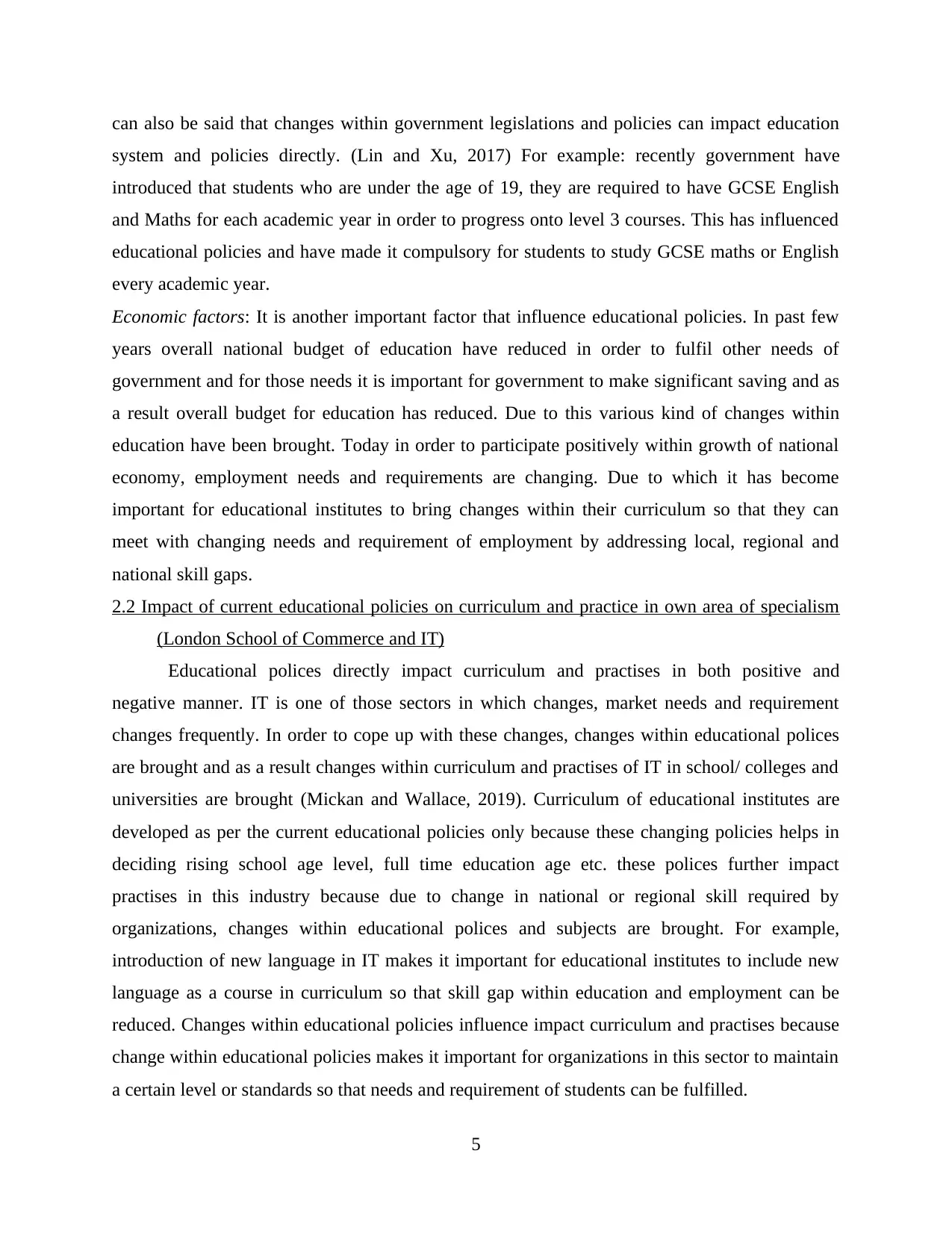
can also be said that changes within government legislations and policies can impact education
system and policies directly. (Lin and Xu, 2017) For example: recently government have
introduced that students who are under the age of 19, they are required to have GCSE English
and Maths for each academic year in order to progress onto level 3 courses. This has influenced
educational policies and have made it compulsory for students to study GCSE maths or English
every academic year.
Economic factors: It is another important factor that influence educational policies. In past few
years overall national budget of education have reduced in order to fulfil other needs of
government and for those needs it is important for government to make significant saving and as
a result overall budget for education has reduced. Due to this various kind of changes within
education have been brought. Today in order to participate positively within growth of national
economy, employment needs and requirements are changing. Due to which it has become
important for educational institutes to bring changes within their curriculum so that they can
meet with changing needs and requirement of employment by addressing local, regional and
national skill gaps.
2.2 Impact of current educational policies on curriculum and practice in own area of specialism
(London School of Commerce and IT)
Educational polices directly impact curriculum and practises in both positive and
negative manner. IT is one of those sectors in which changes, market needs and requirement
changes frequently. In order to cope up with these changes, changes within educational polices
are brought and as a result changes within curriculum and practises of IT in school/ colleges and
universities are brought (Mickan and Wallace, 2019). Curriculum of educational institutes are
developed as per the current educational policies only because these changing policies helps in
deciding rising school age level, full time education age etc. these polices further impact
practises in this industry because due to change in national or regional skill required by
organizations, changes within educational polices and subjects are brought. For example,
introduction of new language in IT makes it important for educational institutes to include new
language as a course in curriculum so that skill gap within education and employment can be
reduced. Changes within educational policies influence impact curriculum and practises because
change within educational policies makes it important for organizations in this sector to maintain
a certain level or standards so that needs and requirement of students can be fulfilled.
5
system and policies directly. (Lin and Xu, 2017) For example: recently government have
introduced that students who are under the age of 19, they are required to have GCSE English
and Maths for each academic year in order to progress onto level 3 courses. This has influenced
educational policies and have made it compulsory for students to study GCSE maths or English
every academic year.
Economic factors: It is another important factor that influence educational policies. In past few
years overall national budget of education have reduced in order to fulfil other needs of
government and for those needs it is important for government to make significant saving and as
a result overall budget for education has reduced. Due to this various kind of changes within
education have been brought. Today in order to participate positively within growth of national
economy, employment needs and requirements are changing. Due to which it has become
important for educational institutes to bring changes within their curriculum so that they can
meet with changing needs and requirement of employment by addressing local, regional and
national skill gaps.
2.2 Impact of current educational policies on curriculum and practice in own area of specialism
(London School of Commerce and IT)
Educational polices directly impact curriculum and practises in both positive and
negative manner. IT is one of those sectors in which changes, market needs and requirement
changes frequently. In order to cope up with these changes, changes within educational polices
are brought and as a result changes within curriculum and practises of IT in school/ colleges and
universities are brought (Mickan and Wallace, 2019). Curriculum of educational institutes are
developed as per the current educational policies only because these changing policies helps in
deciding rising school age level, full time education age etc. these polices further impact
practises in this industry because due to change in national or regional skill required by
organizations, changes within educational polices and subjects are brought. For example,
introduction of new language in IT makes it important for educational institutes to include new
language as a course in curriculum so that skill gap within education and employment can be
reduced. Changes within educational policies influence impact curriculum and practises because
change within educational policies makes it important for organizations in this sector to maintain
a certain level or standards so that needs and requirement of students can be fulfilled.
5
Paraphrase This Document
Need a fresh take? Get an instant paraphrase of this document with our AI Paraphraser
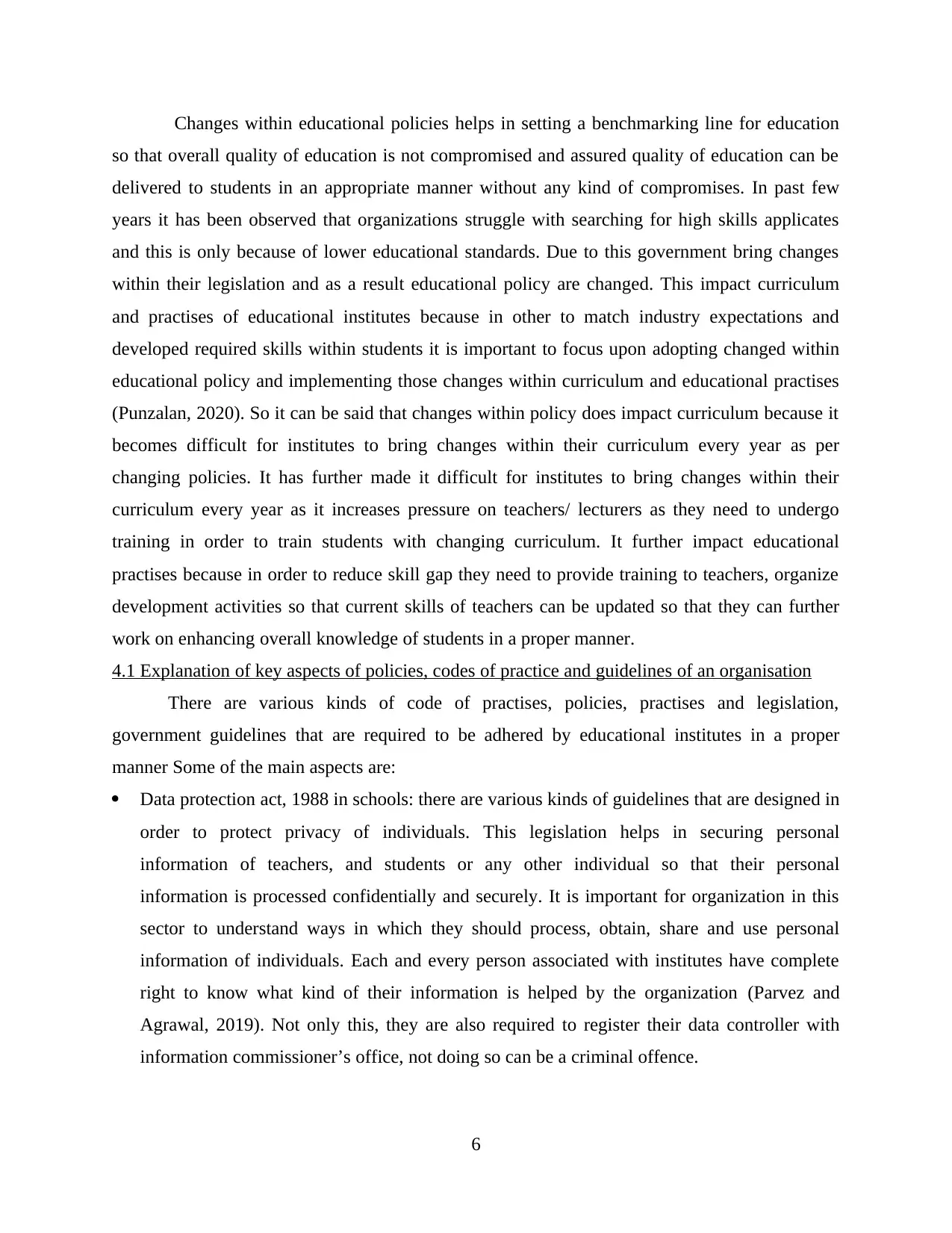
Changes within educational policies helps in setting a benchmarking line for education
so that overall quality of education is not compromised and assured quality of education can be
delivered to students in an appropriate manner without any kind of compromises. In past few
years it has been observed that organizations struggle with searching for high skills applicates
and this is only because of lower educational standards. Due to this government bring changes
within their legislation and as a result educational policy are changed. This impact curriculum
and practises of educational institutes because in other to match industry expectations and
developed required skills within students it is important to focus upon adopting changed within
educational policy and implementing those changes within curriculum and educational practises
(Punzalan, 2020). So it can be said that changes within policy does impact curriculum because it
becomes difficult for institutes to bring changes within their curriculum every year as per
changing policies. It has further made it difficult for institutes to bring changes within their
curriculum every year as it increases pressure on teachers/ lecturers as they need to undergo
training in order to train students with changing curriculum. It further impact educational
practises because in order to reduce skill gap they need to provide training to teachers, organize
development activities so that current skills of teachers can be updated so that they can further
work on enhancing overall knowledge of students in a proper manner.
4.1 Explanation of key aspects of policies, codes of practice and guidelines of an organisation
There are various kinds of code of practises, policies, practises and legislation,
government guidelines that are required to be adhered by educational institutes in a proper
manner Some of the main aspects are:
Data protection act, 1988 in schools: there are various kinds of guidelines that are designed in
order to protect privacy of individuals. This legislation helps in securing personal
information of teachers, and students or any other individual so that their personal
information is processed confidentially and securely. It is important for organization in this
sector to understand ways in which they should process, obtain, share and use personal
information of individuals. Each and every person associated with institutes have complete
right to know what kind of their information is helped by the organization (Parvez and
Agrawal, 2019). Not only this, they are also required to register their data controller with
information commissioner’s office, not doing so can be a criminal offence.
6
so that overall quality of education is not compromised and assured quality of education can be
delivered to students in an appropriate manner without any kind of compromises. In past few
years it has been observed that organizations struggle with searching for high skills applicates
and this is only because of lower educational standards. Due to this government bring changes
within their legislation and as a result educational policy are changed. This impact curriculum
and practises of educational institutes because in other to match industry expectations and
developed required skills within students it is important to focus upon adopting changed within
educational policy and implementing those changes within curriculum and educational practises
(Punzalan, 2020). So it can be said that changes within policy does impact curriculum because it
becomes difficult for institutes to bring changes within their curriculum every year as per
changing policies. It has further made it difficult for institutes to bring changes within their
curriculum every year as it increases pressure on teachers/ lecturers as they need to undergo
training in order to train students with changing curriculum. It further impact educational
practises because in order to reduce skill gap they need to provide training to teachers, organize
development activities so that current skills of teachers can be updated so that they can further
work on enhancing overall knowledge of students in a proper manner.
4.1 Explanation of key aspects of policies, codes of practice and guidelines of an organisation
There are various kinds of code of practises, policies, practises and legislation,
government guidelines that are required to be adhered by educational institutes in a proper
manner Some of the main aspects are:
Data protection act, 1988 in schools: there are various kinds of guidelines that are designed in
order to protect privacy of individuals. This legislation helps in securing personal
information of teachers, and students or any other individual so that their personal
information is processed confidentially and securely. It is important for organization in this
sector to understand ways in which they should process, obtain, share and use personal
information of individuals. Each and every person associated with institutes have complete
right to know what kind of their information is helped by the organization (Parvez and
Agrawal, 2019). Not only this, they are also required to register their data controller with
information commissioner’s office, not doing so can be a criminal offence.
6
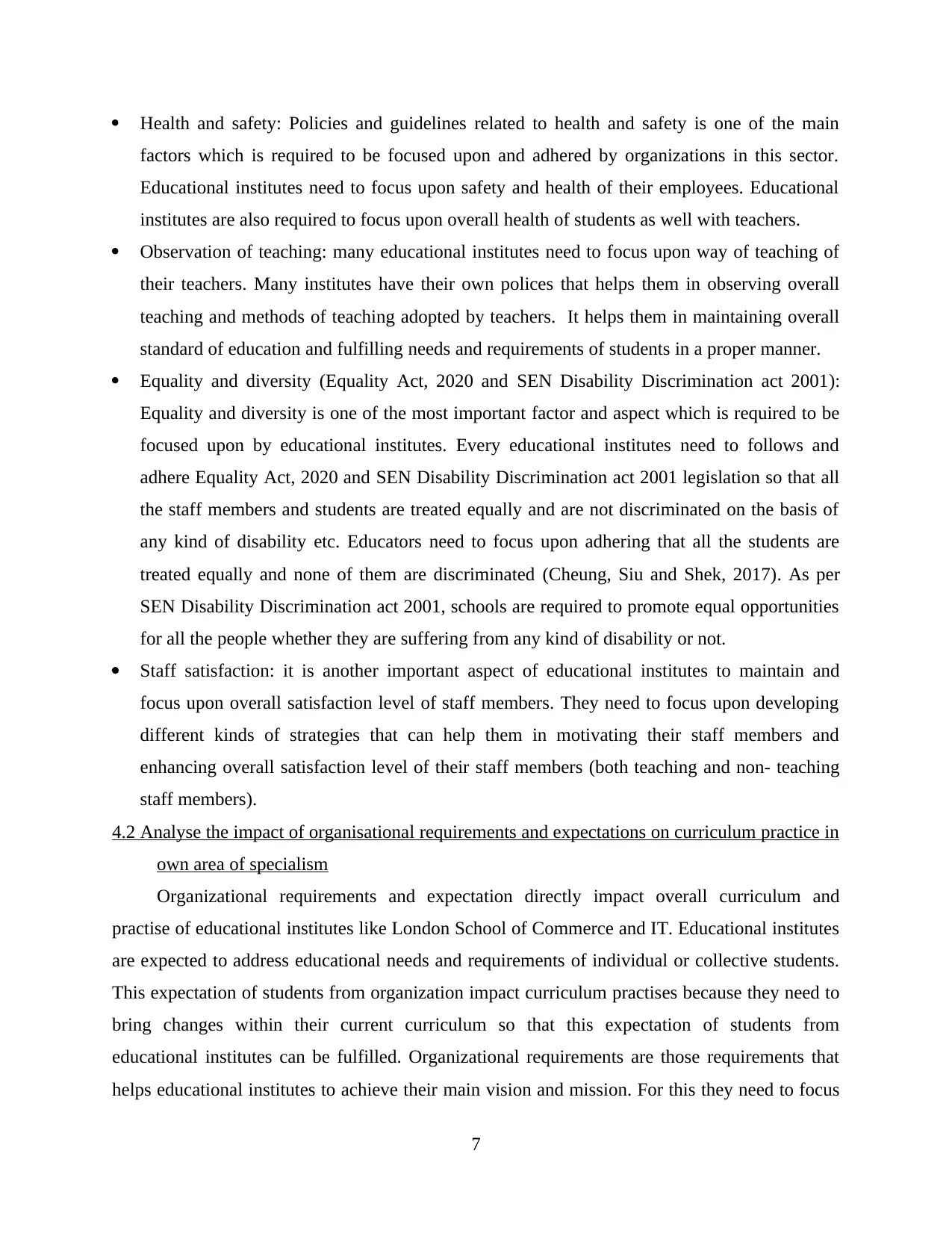
Health and safety: Policies and guidelines related to health and safety is one of the main
factors which is required to be focused upon and adhered by organizations in this sector.
Educational institutes need to focus upon safety and health of their employees. Educational
institutes are also required to focus upon overall health of students as well with teachers.
Observation of teaching: many educational institutes need to focus upon way of teaching of
their teachers. Many institutes have their own polices that helps them in observing overall
teaching and methods of teaching adopted by teachers. It helps them in maintaining overall
standard of education and fulfilling needs and requirements of students in a proper manner.
Equality and diversity (Equality Act, 2020 and SEN Disability Discrimination act 2001):
Equality and diversity is one of the most important factor and aspect which is required to be
focused upon by educational institutes. Every educational institutes need to follows and
adhere Equality Act, 2020 and SEN Disability Discrimination act 2001 legislation so that all
the staff members and students are treated equally and are not discriminated on the basis of
any kind of disability etc. Educators need to focus upon adhering that all the students are
treated equally and none of them are discriminated (Cheung, Siu and Shek, 2017). As per
SEN Disability Discrimination act 2001, schools are required to promote equal opportunities
for all the people whether they are suffering from any kind of disability or not.
Staff satisfaction: it is another important aspect of educational institutes to maintain and
focus upon overall satisfaction level of staff members. They need to focus upon developing
different kinds of strategies that can help them in motivating their staff members and
enhancing overall satisfaction level of their staff members (both teaching and non- teaching
staff members).
4.2 Analyse the impact of organisational requirements and expectations on curriculum practice in
own area of specialism
Organizational requirements and expectation directly impact overall curriculum and
practise of educational institutes like London School of Commerce and IT. Educational institutes
are expected to address educational needs and requirements of individual or collective students.
This expectation of students from organization impact curriculum practises because they need to
bring changes within their current curriculum so that this expectation of students from
educational institutes can be fulfilled. Organizational requirements are those requirements that
helps educational institutes to achieve their main vision and mission. For this they need to focus
7
factors which is required to be focused upon and adhered by organizations in this sector.
Educational institutes need to focus upon safety and health of their employees. Educational
institutes are also required to focus upon overall health of students as well with teachers.
Observation of teaching: many educational institutes need to focus upon way of teaching of
their teachers. Many institutes have their own polices that helps them in observing overall
teaching and methods of teaching adopted by teachers. It helps them in maintaining overall
standard of education and fulfilling needs and requirements of students in a proper manner.
Equality and diversity (Equality Act, 2020 and SEN Disability Discrimination act 2001):
Equality and diversity is one of the most important factor and aspect which is required to be
focused upon by educational institutes. Every educational institutes need to follows and
adhere Equality Act, 2020 and SEN Disability Discrimination act 2001 legislation so that all
the staff members and students are treated equally and are not discriminated on the basis of
any kind of disability etc. Educators need to focus upon adhering that all the students are
treated equally and none of them are discriminated (Cheung, Siu and Shek, 2017). As per
SEN Disability Discrimination act 2001, schools are required to promote equal opportunities
for all the people whether they are suffering from any kind of disability or not.
Staff satisfaction: it is another important aspect of educational institutes to maintain and
focus upon overall satisfaction level of staff members. They need to focus upon developing
different kinds of strategies that can help them in motivating their staff members and
enhancing overall satisfaction level of their staff members (both teaching and non- teaching
staff members).
4.2 Analyse the impact of organisational requirements and expectations on curriculum practice in
own area of specialism
Organizational requirements and expectation directly impact overall curriculum and
practise of educational institutes like London School of Commerce and IT. Educational institutes
are expected to address educational needs and requirements of individual or collective students.
This expectation of students from organization impact curriculum practises because they need to
bring changes within their current curriculum so that this expectation of students from
educational institutes can be fulfilled. Organizational requirements are those requirements that
helps educational institutes to achieve their main vision and mission. For this they need to focus
7
⊘ This is a preview!⊘
Do you want full access?
Subscribe today to unlock all pages.

Trusted by 1+ million students worldwide
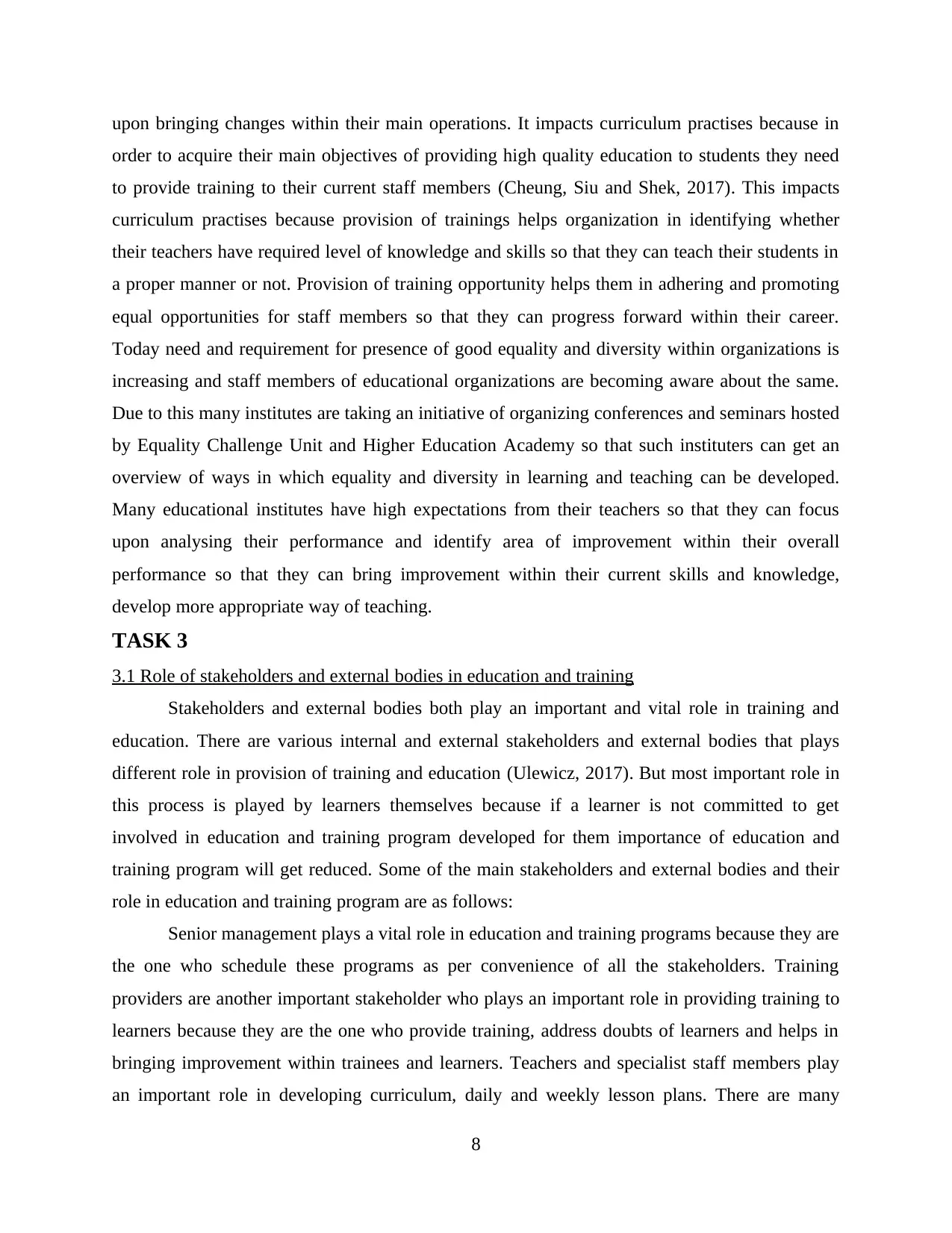
upon bringing changes within their main operations. It impacts curriculum practises because in
order to acquire their main objectives of providing high quality education to students they need
to provide training to their current staff members (Cheung, Siu and Shek, 2017). This impacts
curriculum practises because provision of trainings helps organization in identifying whether
their teachers have required level of knowledge and skills so that they can teach their students in
a proper manner or not. Provision of training opportunity helps them in adhering and promoting
equal opportunities for staff members so that they can progress forward within their career.
Today need and requirement for presence of good equality and diversity within organizations is
increasing and staff members of educational organizations are becoming aware about the same.
Due to this many institutes are taking an initiative of organizing conferences and seminars hosted
by Equality Challenge Unit and Higher Education Academy so that such instituters can get an
overview of ways in which equality and diversity in learning and teaching can be developed.
Many educational institutes have high expectations from their teachers so that they can focus
upon analysing their performance and identify area of improvement within their overall
performance so that they can bring improvement within their current skills and knowledge,
develop more appropriate way of teaching.
TASK 3
3.1 Role of stakeholders and external bodies in education and training
Stakeholders and external bodies both play an important and vital role in training and
education. There are various internal and external stakeholders and external bodies that plays
different role in provision of training and education (Ulewicz, 2017). But most important role in
this process is played by learners themselves because if a learner is not committed to get
involved in education and training program developed for them importance of education and
training program will get reduced. Some of the main stakeholders and external bodies and their
role in education and training program are as follows:
Senior management plays a vital role in education and training programs because they are
the one who schedule these programs as per convenience of all the stakeholders. Training
providers are another important stakeholder who plays an important role in providing training to
learners because they are the one who provide training, address doubts of learners and helps in
bringing improvement within trainees and learners. Teachers and specialist staff members play
an important role in developing curriculum, daily and weekly lesson plans. There are many
8
order to acquire their main objectives of providing high quality education to students they need
to provide training to their current staff members (Cheung, Siu and Shek, 2017). This impacts
curriculum practises because provision of trainings helps organization in identifying whether
their teachers have required level of knowledge and skills so that they can teach their students in
a proper manner or not. Provision of training opportunity helps them in adhering and promoting
equal opportunities for staff members so that they can progress forward within their career.
Today need and requirement for presence of good equality and diversity within organizations is
increasing and staff members of educational organizations are becoming aware about the same.
Due to this many institutes are taking an initiative of organizing conferences and seminars hosted
by Equality Challenge Unit and Higher Education Academy so that such instituters can get an
overview of ways in which equality and diversity in learning and teaching can be developed.
Many educational institutes have high expectations from their teachers so that they can focus
upon analysing their performance and identify area of improvement within their overall
performance so that they can bring improvement within their current skills and knowledge,
develop more appropriate way of teaching.
TASK 3
3.1 Role of stakeholders and external bodies in education and training
Stakeholders and external bodies both play an important and vital role in training and
education. There are various internal and external stakeholders and external bodies that plays
different role in provision of training and education (Ulewicz, 2017). But most important role in
this process is played by learners themselves because if a learner is not committed to get
involved in education and training program developed for them importance of education and
training program will get reduced. Some of the main stakeholders and external bodies and their
role in education and training program are as follows:
Senior management plays a vital role in education and training programs because they are
the one who schedule these programs as per convenience of all the stakeholders. Training
providers are another important stakeholder who plays an important role in providing training to
learners because they are the one who provide training, address doubts of learners and helps in
bringing improvement within trainees and learners. Teachers and specialist staff members play
an important role in developing curriculum, daily and weekly lesson plans. There are many
8
Paraphrase This Document
Need a fresh take? Get an instant paraphrase of this document with our AI Paraphraser
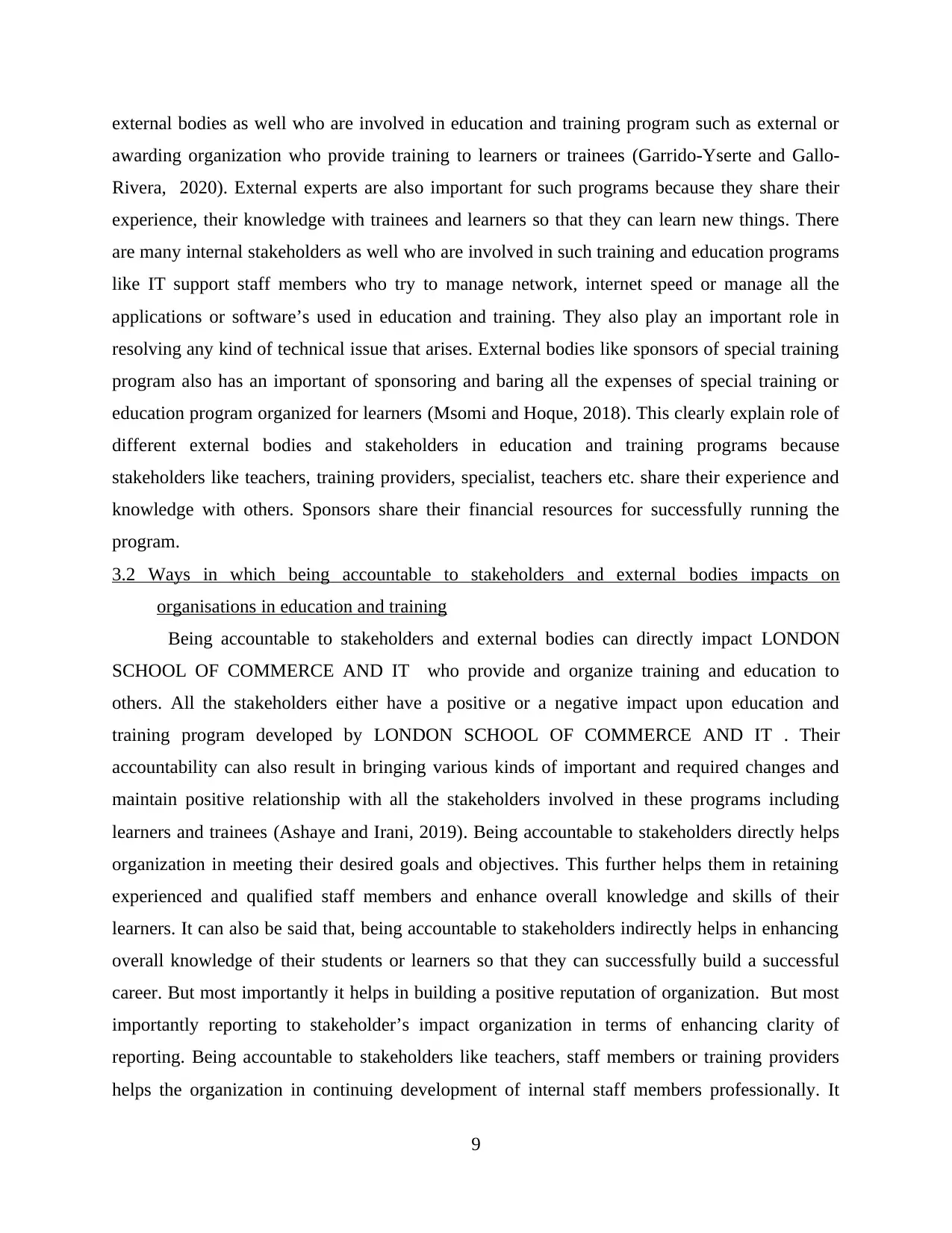
external bodies as well who are involved in education and training program such as external or
awarding organization who provide training to learners or trainees (Garrido-Yserte and Gallo-
Rivera, 2020). External experts are also important for such programs because they share their
experience, their knowledge with trainees and learners so that they can learn new things. There
are many internal stakeholders as well who are involved in such training and education programs
like IT support staff members who try to manage network, internet speed or manage all the
applications or software’s used in education and training. They also play an important role in
resolving any kind of technical issue that arises. External bodies like sponsors of special training
program also has an important of sponsoring and baring all the expenses of special training or
education program organized for learners (Msomi and Hoque, 2018). This clearly explain role of
different external bodies and stakeholders in education and training programs because
stakeholders like teachers, training providers, specialist, teachers etc. share their experience and
knowledge with others. Sponsors share their financial resources for successfully running the
program.
3.2 Ways in which being accountable to stakeholders and external bodies impacts on
organisations in education and training
Being accountable to stakeholders and external bodies can directly impact LONDON
SCHOOL OF COMMERCE AND IT who provide and organize training and education to
others. All the stakeholders either have a positive or a negative impact upon education and
training program developed by LONDON SCHOOL OF COMMERCE AND IT . Their
accountability can also result in bringing various kinds of important and required changes and
maintain positive relationship with all the stakeholders involved in these programs including
learners and trainees (Ashaye and Irani, 2019). Being accountable to stakeholders directly helps
organization in meeting their desired goals and objectives. This further helps them in retaining
experienced and qualified staff members and enhance overall knowledge and skills of their
learners. It can also be said that, being accountable to stakeholders indirectly helps in enhancing
overall knowledge of their students or learners so that they can successfully build a successful
career. But most importantly it helps in building a positive reputation of organization. But most
importantly reporting to stakeholder’s impact organization in terms of enhancing clarity of
reporting. Being accountable to stakeholders like teachers, staff members or training providers
helps the organization in continuing development of internal staff members professionally. It
9
awarding organization who provide training to learners or trainees (Garrido-Yserte and Gallo-
Rivera, 2020). External experts are also important for such programs because they share their
experience, their knowledge with trainees and learners so that they can learn new things. There
are many internal stakeholders as well who are involved in such training and education programs
like IT support staff members who try to manage network, internet speed or manage all the
applications or software’s used in education and training. They also play an important role in
resolving any kind of technical issue that arises. External bodies like sponsors of special training
program also has an important of sponsoring and baring all the expenses of special training or
education program organized for learners (Msomi and Hoque, 2018). This clearly explain role of
different external bodies and stakeholders in education and training programs because
stakeholders like teachers, training providers, specialist, teachers etc. share their experience and
knowledge with others. Sponsors share their financial resources for successfully running the
program.
3.2 Ways in which being accountable to stakeholders and external bodies impacts on
organisations in education and training
Being accountable to stakeholders and external bodies can directly impact LONDON
SCHOOL OF COMMERCE AND IT who provide and organize training and education to
others. All the stakeholders either have a positive or a negative impact upon education and
training program developed by LONDON SCHOOL OF COMMERCE AND IT . Their
accountability can also result in bringing various kinds of important and required changes and
maintain positive relationship with all the stakeholders involved in these programs including
learners and trainees (Ashaye and Irani, 2019). Being accountable to stakeholders directly helps
organization in meeting their desired goals and objectives. This further helps them in retaining
experienced and qualified staff members and enhance overall knowledge and skills of their
learners. It can also be said that, being accountable to stakeholders indirectly helps in enhancing
overall knowledge of their students or learners so that they can successfully build a successful
career. But most importantly it helps in building a positive reputation of organization. But most
importantly reporting to stakeholder’s impact organization in terms of enhancing clarity of
reporting. Being accountable to stakeholders like teachers, staff members or training providers
helps the organization in continuing development of internal staff members professionally. It
9
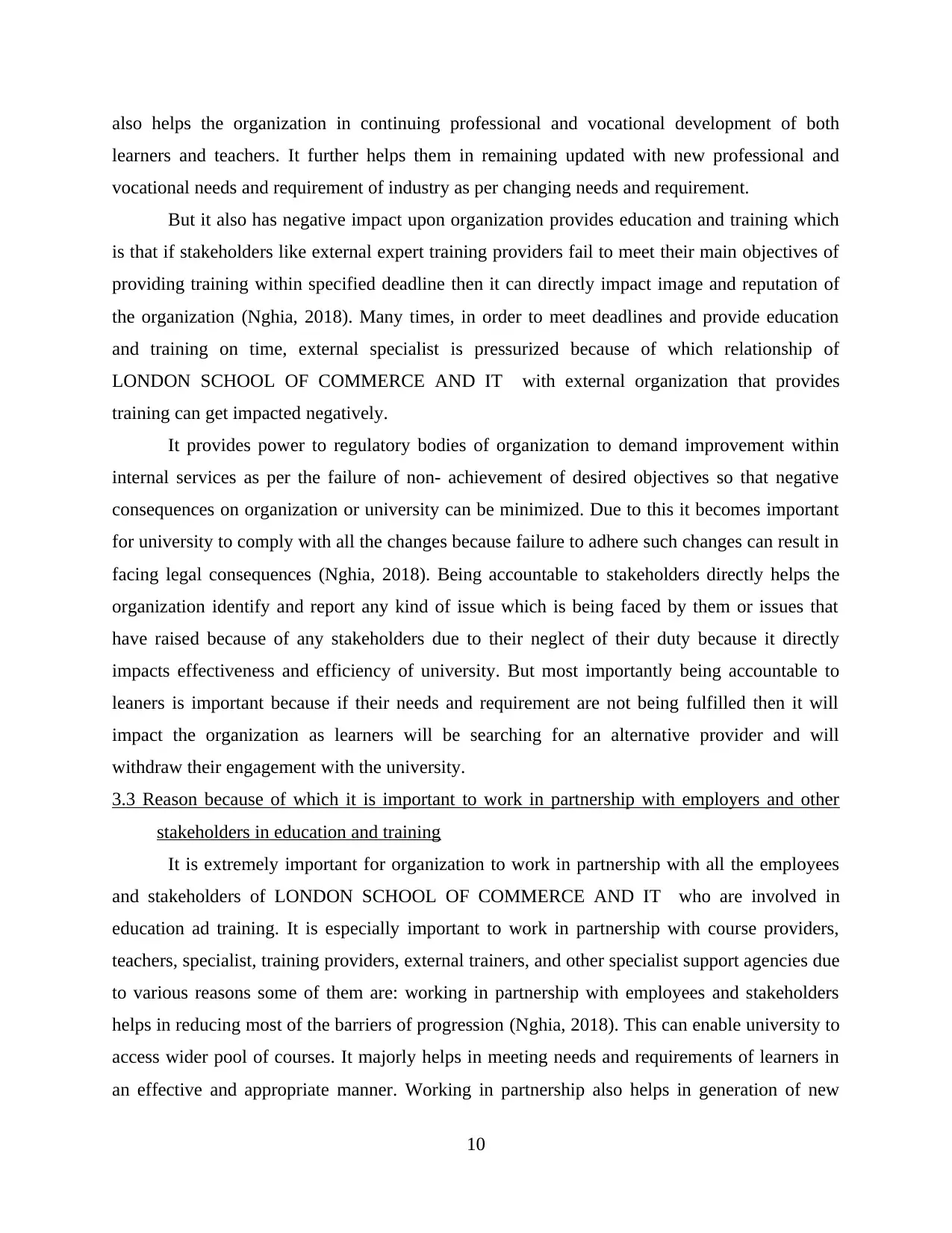
also helps the organization in continuing professional and vocational development of both
learners and teachers. It further helps them in remaining updated with new professional and
vocational needs and requirement of industry as per changing needs and requirement.
But it also has negative impact upon organization provides education and training which
is that if stakeholders like external expert training providers fail to meet their main objectives of
providing training within specified deadline then it can directly impact image and reputation of
the organization (Nghia, 2018). Many times, in order to meet deadlines and provide education
and training on time, external specialist is pressurized because of which relationship of
LONDON SCHOOL OF COMMERCE AND IT with external organization that provides
training can get impacted negatively.
It provides power to regulatory bodies of organization to demand improvement within
internal services as per the failure of non- achievement of desired objectives so that negative
consequences on organization or university can be minimized. Due to this it becomes important
for university to comply with all the changes because failure to adhere such changes can result in
facing legal consequences (Nghia, 2018). Being accountable to stakeholders directly helps the
organization identify and report any kind of issue which is being faced by them or issues that
have raised because of any stakeholders due to their neglect of their duty because it directly
impacts effectiveness and efficiency of university. But most importantly being accountable to
leaners is important because if their needs and requirement are not being fulfilled then it will
impact the organization as learners will be searching for an alternative provider and will
withdraw their engagement with the university.
3.3 Reason because of which it is important to work in partnership with employers and other
stakeholders in education and training
It is extremely important for organization to work in partnership with all the employees
and stakeholders of LONDON SCHOOL OF COMMERCE AND IT who are involved in
education ad training. It is especially important to work in partnership with course providers,
teachers, specialist, training providers, external trainers, and other specialist support agencies due
to various reasons some of them are: working in partnership with employees and stakeholders
helps in reducing most of the barriers of progression (Nghia, 2018). This can enable university to
access wider pool of courses. It majorly helps in meeting needs and requirements of learners in
an effective and appropriate manner. Working in partnership also helps in generation of new
10
learners and teachers. It further helps them in remaining updated with new professional and
vocational needs and requirement of industry as per changing needs and requirement.
But it also has negative impact upon organization provides education and training which
is that if stakeholders like external expert training providers fail to meet their main objectives of
providing training within specified deadline then it can directly impact image and reputation of
the organization (Nghia, 2018). Many times, in order to meet deadlines and provide education
and training on time, external specialist is pressurized because of which relationship of
LONDON SCHOOL OF COMMERCE AND IT with external organization that provides
training can get impacted negatively.
It provides power to regulatory bodies of organization to demand improvement within
internal services as per the failure of non- achievement of desired objectives so that negative
consequences on organization or university can be minimized. Due to this it becomes important
for university to comply with all the changes because failure to adhere such changes can result in
facing legal consequences (Nghia, 2018). Being accountable to stakeholders directly helps the
organization identify and report any kind of issue which is being faced by them or issues that
have raised because of any stakeholders due to their neglect of their duty because it directly
impacts effectiveness and efficiency of university. But most importantly being accountable to
leaners is important because if their needs and requirement are not being fulfilled then it will
impact the organization as learners will be searching for an alternative provider and will
withdraw their engagement with the university.
3.3 Reason because of which it is important to work in partnership with employers and other
stakeholders in education and training
It is extremely important for organization to work in partnership with all the employees
and stakeholders of LONDON SCHOOL OF COMMERCE AND IT who are involved in
education ad training. It is especially important to work in partnership with course providers,
teachers, specialist, training providers, external trainers, and other specialist support agencies due
to various reasons some of them are: working in partnership with employees and stakeholders
helps in reducing most of the barriers of progression (Nghia, 2018). This can enable university to
access wider pool of courses. It majorly helps in meeting needs and requirements of learners in
an effective and appropriate manner. Working in partnership also helps in generation of new
10
⊘ This is a preview!⊘
Do you want full access?
Subscribe today to unlock all pages.

Trusted by 1+ million students worldwide
1 out of 15
Related Documents
Your All-in-One AI-Powered Toolkit for Academic Success.
+13062052269
info@desklib.com
Available 24*7 on WhatsApp / Email
![[object Object]](/_next/static/media/star-bottom.7253800d.svg)
Unlock your academic potential
Copyright © 2020–2026 A2Z Services. All Rights Reserved. Developed and managed by ZUCOL.


